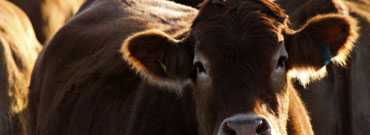BSE (bovine spongiform encephalopathy) is a progressive neurological disorder of cattle that results from infection by an unusual transmissible agent called a prion. The nature of the transmissible agent is not well understood. Currently, the most accepted theory is that the agent is a modified form of a normal protein known as prion protein. For reasons that are not yet understood, the normal prion protein changes into a pathogenic (harmful) form that then damages the central nervous system of cattle.

Mad Cow Disease is a neurological disorder of cattle.
News and Highlights

New Case of BSE Detected in United States
On July 18, 2017, the U.S. Department of Agriculture (USDA) announced the confirmation of the fifth U.S. case of bovine spongiform encephalopathy (BSE) in an 11-year-old cow in Alabama. The cow was found through USDA’s routine surveillance. The cow was positive for an atypical (L-type) strain of BSE. Atypical BSE usually occurs in older cattle and seems to arise spontaneously in cattle populations.
See the USDA notice.
- Page last reviewed: August 9, 2017
- Page last updated: August 9, 2017
- Content source:


 ShareCompartir
ShareCompartir